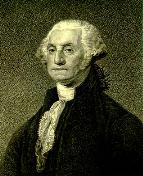
After some inconclusive maneuvering between the British and American armies, in late 1777 George Washington and his men retired to Valley Forge for the winter, under circumstances that would try any man's soul. The following is excerpted from a biography of Washington published just eight years after his death by a contemporary, David Ramsay.
* * *
Valley Forge, about twenty-five miles distant from Philadelphia, was fixed upon for the winter quarters of the Americans. This position was preferred to distant and more comfortable villages, as being calculated to give the most extensive security to the country. ... To a want of cloathing was added a want of provisions. For some days there was little less than a famine in the camp. Washington was compelled to make seizures for the support of his army. Congress had authorized him so to do; but he wished the civil authority to manage the delicate business of impressment, and regretted the measure as subversive of discipline, and calculated to raise in the soldiers a disposition to licentiousness and plunder. To suffer his army to starve or disband, or to feed them by force, were the only alternatives offered to his choice. ...
Great were the difficulties Washington had to contend with for feeding and cloathing his army; but they were not the only ones which at this time pressed on him. The states of Pennsylvania and New-Jersey were importunate with him to cover them from the incursions of the enemy. In both there were many discontented individuals, who, regretting their past losses and present danger from the vicinity of a conquering army, were so far misled by their feelings as to suppose it to be the fault of Gen. Washington, that the inferior destitute army under his immediate command had not been as successful as the superior well supported northern army under Gen. Gates. The legislature of Pennsylvania, probably sore from the loss of their capital, on hearing that Washington was about to retire into winter quarters, presented a remonstrance to Congress on that subject, in which their dissatisfaction with the General was far from being concealed. A copy of this being sent to him, he addressed Congress in terms very different from his usual style. He stated, "that though every thing in his power had been done for supporting his army, yet their inactivity, arising from their manifold wants, was charged to his account; that the army seldom had provisions for two days in advance; that few of his men had more than one shirt, many only a moiety of one, and some none at all; that soap, vinegar, and such like articles, though allowed by Congress, had not been seen in camp for several weeks; that by a field return 2898 of his army were unfit for duty, because they were barefooted, and otherwise naked; that his whole effective force in camp amounted to no more than 8200 men fit for duty; that notwithstanding these complicated wants, the remonstrance of the Pennsylvania legislature reprobated the measure of his going into winter quarters, as if its authors thought the soldiers were made of stocks or stones, and as if they conceived it easily practicable for an inferior army, circumstanced as his was, to confine a superior one, well appointed and every way provided for a winter's campaign, within the city of Philadelphia, and to cover all the circumjacent country from their depredation." He assured the complainers, "that it was much easier to draw up remonstrances in a comfortable room by a good fire-side, than to occupy a cold bleak hill, and sleep under frost and snow, without clothes or blankets."1
Copyright © 2000, The Daily Objectivist - Reprinted with permission of The Daily Objectivist and Davidmbrown.com.
28 Nov 2009 (last edit: 8 Jan 2024)
You can assist the work of Freedom Circle by purchasing one of the works discussed above:
-
David Ramsay, The Life of George Washington, Commander in Chief of the Armies of the United States of America, throughout the war which established their Independence; and First President of the United States, New York: Hopkins & Seymour, 1807, pp. 78-81. (Freedom Circle note) ↩︎
